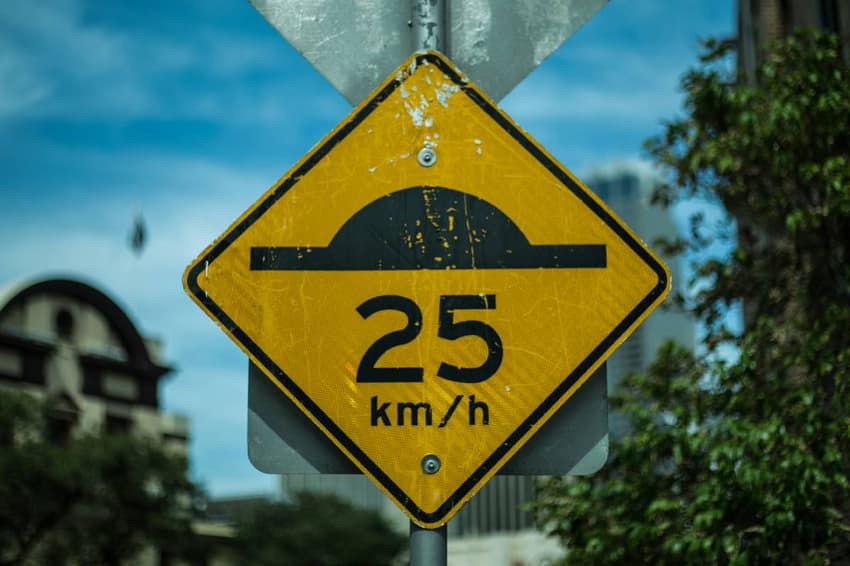Eight Norwegian words that just sound wrong in English

Norwegian can be a tricky language to get your head around, and many words that can elicit a chuckle long after you get used to the lingo.
When Norwegians switch over to speaking English, it can – at times – result in a few chuckles from English speakers.
This is nothing to do with their accent or English skills though. If you have ever talked about the high number of speed bumps in some Norwegian streets, you'll know what we mean.
READ MORE: Six useful Norwegian words and expressions which are hard to translate
Some Norwegian words sound eerily similar to entirely different words in English. It's like a linguistic game of "almost but not quite," and it can make for some amusing or awkward conversation moments.
So, which Norwegian words, when heard through the lens of the English language, have the potential to raise eyebrows, trigger laughter, or even cause a few unintentional double-takes?
There are more than several dozen, but these are our top picks.
Fartsdump (speed bump)
While this Norwegian word means "speed bump," the unfortunate English pronunciation makes it sound like "farts dump."
It's not quite the image you want when discussing road safety...
Skitt (dirt)
"Skitt" is the Norwegian word for "dirt," but when spoken in English, it's quite similar to a less polite term: "shit." Rest assured, Norwegians are (most likely) talking about tidying up, not causing offense!
Prick (Dot)
In Norwegian, "prick" means "dot" or "point." However, in English, it carries a rather derogatory connotation. This double meaning can lead to some interesting conversations…
Kok (Cook)
Norwegians may invite you to a meal and say that they will be your "kok" ("cook") for the evening.
But to an English speaker's ears, it can sound like an invitation to something else entirely...

When Norwegians say, "Oh, bra," they're actually referring to something positive, not discussing lingerie. Photo by Lennart Schneider on Unsplash
Bra (Good)
"Bra" is a common Norwegian word for "good." In most interactions, you'll describe something as "bra" (good) or "ikke bra" (not good).
However, in English, it sounds like the undergarment "bra." So, when Norwegians mix say, "Oh, bra," they're not talking about lingerie.
Coincidently, when one's mind goes to an unsavory place Norwegians may say "get your head out of the luggage" - presumably because this is where the bras and underwear are kept.
Seks (Six)
Counting to six in Norwegian involves saying "seks," which closely resembles the English word "sex."
There's no need to dig deeper into why this one could turn a few heads and elicit some giggles.
Slutt (End)
When Norwegians say "slutt," they mean "end" or "stop." Unfortunately, in English, it sounds like the word "slut."
So, don't be alarmed if someone declares, "Slutt!" in Norway; they're probably just wrapping something up.
Dager (Days)
Norwegians talk about "dager" when referring to "days." However, English speakers may hear "dagger," leading to puzzling conversations about time.
Rest assured, there's no need to fear any sharp objects.
Overall, fun language mishaps like these should be treated as a source of amusement – so keep a sense of humor if you stumble upon one of these "lost in translation" moments.
And remember to ask for clarification if needed, especially if you're starting your journey of learning the Norwegian language.
READ MORE: Ten Norwegian words you need to learn to understand Norway
Embrace the linguistic differences, have a laugh, respect the speed limit in areas filled with fartsdumper, and enjoy the journey of discovering new words and meanings in Norwegian.
Are there any other Norwegian words that don't sound right in English, or any other languages? You can leave your suggestions in the comments.
Comments
See Also
When Norwegians switch over to speaking English, it can – at times – result in a few chuckles from English speakers.
This is nothing to do with their accent or English skills though. If you have ever talked about the high number of speed bumps in some Norwegian streets, you'll know what we mean.
READ MORE: Six useful Norwegian words and expressions which are hard to translate
Some Norwegian words sound eerily similar to entirely different words in English. It's like a linguistic game of "almost but not quite," and it can make for some amusing or awkward conversation moments.
So, which Norwegian words, when heard through the lens of the English language, have the potential to raise eyebrows, trigger laughter, or even cause a few unintentional double-takes?
There are more than several dozen, but these are our top picks.
Fartsdump (speed bump)
While this Norwegian word means "speed bump," the unfortunate English pronunciation makes it sound like "farts dump."
It's not quite the image you want when discussing road safety...
Skitt (dirt)
"Skitt" is the Norwegian word for "dirt," but when spoken in English, it's quite similar to a less polite term: "shit." Rest assured, Norwegians are (most likely) talking about tidying up, not causing offense!
Prick (Dot)
In Norwegian, "prick" means "dot" or "point." However, in English, it carries a rather derogatory connotation. This double meaning can lead to some interesting conversations…
Kok (Cook)
Norwegians may invite you to a meal and say that they will be your "kok" ("cook") for the evening.
But to an English speaker's ears, it can sound like an invitation to something else entirely...

Bra (Good)
"Bra" is a common Norwegian word for "good." In most interactions, you'll describe something as "bra" (good) or "ikke bra" (not good).
However, in English, it sounds like the undergarment "bra." So, when Norwegians mix say, "Oh, bra," they're not talking about lingerie.
Coincidently, when one's mind goes to an unsavory place Norwegians may say "get your head out of the luggage" - presumably because this is where the bras and underwear are kept.
Seks (Six)
Counting to six in Norwegian involves saying "seks," which closely resembles the English word "sex."
There's no need to dig deeper into why this one could turn a few heads and elicit some giggles.
Slutt (End)
When Norwegians say "slutt," they mean "end" or "stop." Unfortunately, in English, it sounds like the word "slut."
So, don't be alarmed if someone declares, "Slutt!" in Norway; they're probably just wrapping something up.
Dager (Days)
Norwegians talk about "dager" when referring to "days." However, English speakers may hear "dagger," leading to puzzling conversations about time.
Rest assured, there's no need to fear any sharp objects.
Overall, fun language mishaps like these should be treated as a source of amusement – so keep a sense of humor if you stumble upon one of these "lost in translation" moments.
And remember to ask for clarification if needed, especially if you're starting your journey of learning the Norwegian language.
READ MORE: Ten Norwegian words you need to learn to understand Norway
Embrace the linguistic differences, have a laugh, respect the speed limit in areas filled with fartsdumper, and enjoy the journey of discovering new words and meanings in Norwegian.
Are there any other Norwegian words that don't sound right in English, or any other languages? You can leave your suggestions in the comments.
Join the conversation in our comments section below. Share your own views and experience and if you have a question or suggestion for our journalists then email us at [email protected].
Please keep comments civil, constructive and on topic – and make sure to read our terms of use before getting involved.
Please log in here to leave a comment.